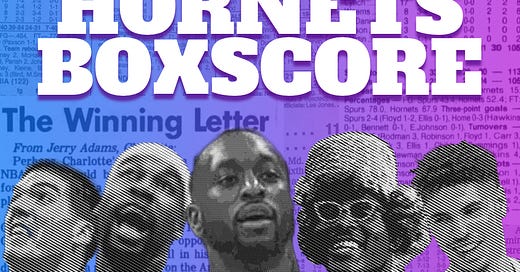3 Things You Probably Didn't Know About The Larry Johnson Trade
Bob Bass' regrets, back injuries and a trade that could have been
On Sunday July 14th, 1996, the Charlotte Hornets traded their first, and to this date of publication ONLY, number one overall draft pick, Larry Johnson. In return the Hornets got out from under the 70 million dollars owed to Johnson plus Anthony Mason and Brad Lohaus. Here are 3 things you probably didn’t know about that trade.
General Manager Bob Bass regretted not trading Larry Johnson sooner
After giving Johnson his massive 12-year, $84 million contract, the Hornets found themselves in a financial bind. There simply wasn’t enough money—or willingness to spend it—left to retain their other rising star, Alonzo Mourning. Mourning, a dominant presence in the paint and a future MVP candidate, was the kind of player franchises could build around, but Charlotte’s financial commitment to Johnson left them no choice but to trade Mourning.
While Bass didn’t necessarily regret the return from the Mourning trade—getting Glen Rice, one of the best shooters in the league—he couldn’t help but wonder what might have been if the Knicks had shown interest in Johnson sooner. Moving Johnson earlier would have given the Hornets a chance to retain Mourning, fundamentally changing the trajectory of the franchise.
"Three or four years from now, the Hornets could still be getting benefits from the Alonzo trade," Bass said. "I feel sorry for Orlando because they got nothing (for Shaquille O'Neal, who signed with the Lakers). That's a bad deal."
Still, Bass regrets not finding a way to retain Mourning, a league most valuable player candidate last season. He didn't anticipate the ability to trade Johnson to the New York Knicks.
"Larry was still here and we just couldn't function with those two big contracts," Bass said. "If the Larry Johnson trade had been made before that, we would have kept Alonzo."
Rick Bonnell, “Mourning Trade Was A Huge Loss With Big Benefits,” Charlotte Observer, October 21, 1999
In the end, while Bass orchestrated significant trades that kept the Hornets competitive, he couldn’t shake the regret of not finding a way to keep a future Hall of Famer by offloading Johnson sooner.
Larry Johnson’s back injury didn’t get him traded, his contract did
Larry Johnson had nine years, $70 million dollars left on his mega-deal in the summer of ‘96. This on its own would have made it difficult to move his contract but he also had a 10 million dollar trade kicker that he reportedly would only waive if he were traded to his hometown Dallas Mavericks.
It was this same massive contract that would ultimately spell the end of Johnson’s time in Charlotte. While his back injury in 1993 was well-documented and certainly limited his explosive playstyle, they weren’t the driving force behind his departure. After a herniated disc in his back kept him out of 31 games in 1993 and severely limited him in 1994, Johnson remade his body and his offensive game to include more 3 pointers and less high flying dunks. He made an All-Star game in 1995 and score 20+ points per game in his final season in Charlotte.
As one of the highest-paid players in the league, Johnson’s salary and the implications it created began to outweigh his production, especially in a league with a salary cap that required careful roster management. The cap was smaller, massive TV deals didn’t exist yet, nor did the loopholes we’ve come to know and love like the Mid-Level Exception. The Hornets were a small-market team, and committing such a large portion of their salary cap to one player—even one as talented and popular as Johnson—restricted their ability to make other moves to improve the roster. After losing Alonzo Mourning the Hornets found themselves too small and too focused on offense to when in the rough and tumble East.
Ultimately, Charlotte needed flexibility. The New York Knicks, always looking to bolster their star power, saw an opportunity. By sending Anthony Mason and Brad Lohaus to Charlotte in exchange for Johnson, the Hornets could shed his massive contract and focus on restructuring the team around other core players, while the Knicks were willing to take on the financial commitment.
In the end, it wasn’t Johnson’s declining health but his massive contract, paired with the financial realities of the league, that led to his departure from Charlotte. His trade was less about on-court performance and more about the business of basketball.
The Knicks didn’t make the only offer for Larry Johnson
Keep reading with a 7-day free trial
Subscribe to Every Hornets Boxscore to keep reading this post and get 7 days of free access to the full post archives.



